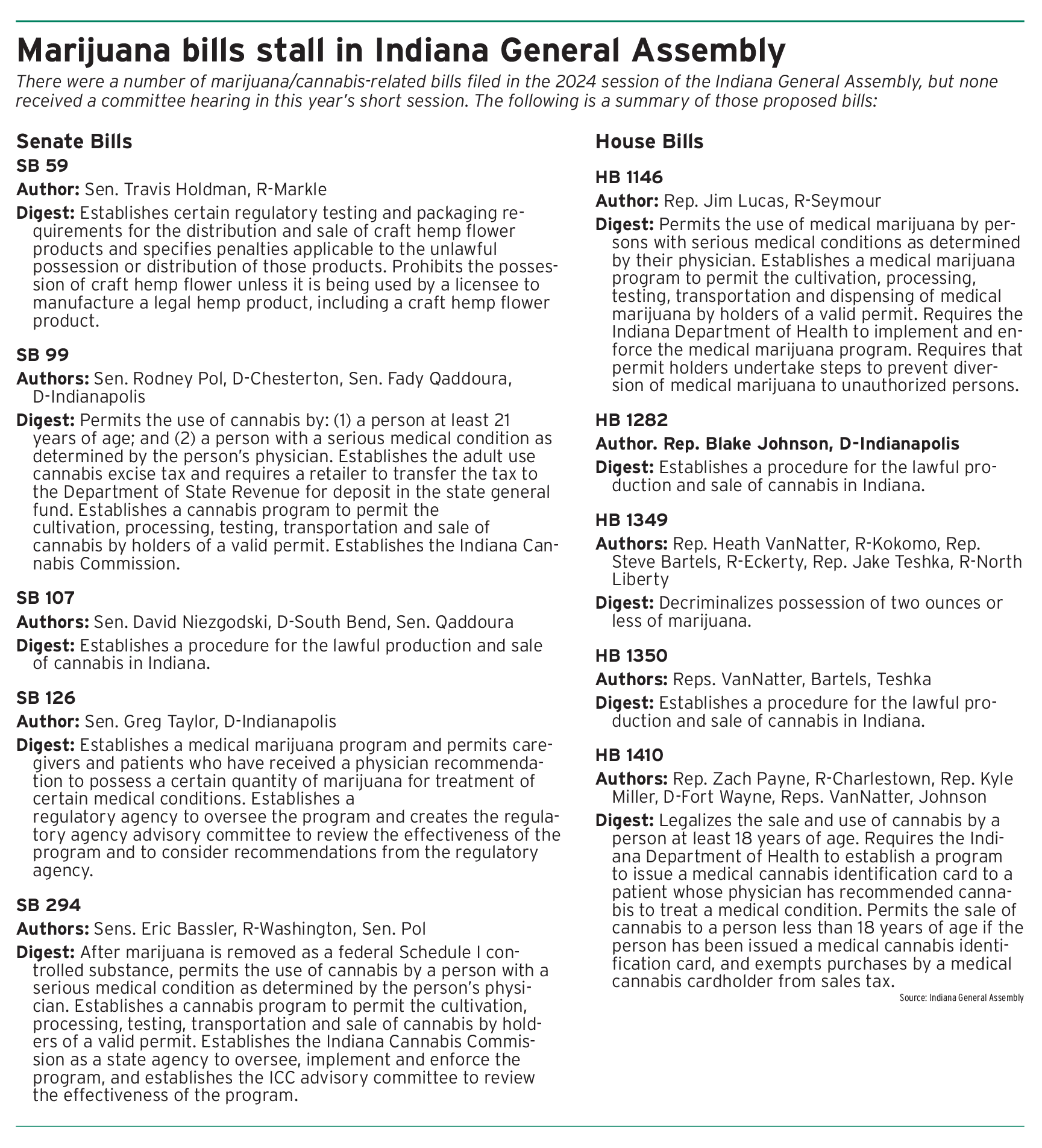Subscriber Benefit
As a subscriber you can listen to articles at work, in the car, or while you work out. Subscribe NowTo some, it seemed like the 2023 session of the Indiana General Assembly marked a turning point for marijuana-related legislation.

In 2023, House Bill 1297, authored by Rep. Heath VanNatter, R-Kokomo, made history by actually getting a legislative hearing. That bill would have decriminalized possession of two ounces or less of marijuana.
Advocates and legislators who support decriminalization, or legalizing marijuana for recreational or medical uses, held out hope that the legislative momentum would continue in 2024.
That didn’t prove to be the case.
This year, there were 10 marijuana-related bills filed in the Indiana House and Senate.
None made it out of committee.
VanNatter, who co-authored HBs 1349, 1350 and 1410 this year, said he hears from constituents all the time about the state’s need to legalize marijuana for either recreational or medical reasons.
The Kokomo representative said there’s still hesitation from the Legislature and Gov. Eric Holcomb to pass bills linked to legalization.
Still, given last year’s historic hearing, VanNatter said he remains confident Indiana will join surrounding states in legalizing marijuana.
“We’re going to get there at some point,” he said.
Polls show support
The 2022 Hoosier Survey, a poll conducted by Indiana Public Broadcasting and Ball State University’s Bowen Center for Public Affairs, showed more than 85% of the 600 respondents supported marijuana legalization in some form, compared to 15% who said it should be illegal.
Against that backdrop, legislators in the 2024 session filed bills like Senate Bill 126, authored by Senate Minority Leader Greg Taylor of Indianapolis, that looked to establish a medical marijuana program and to permit caregivers and patients who have received a physician recommendation to possess a certain quantity of marijuana for treatment of certain medical conditions.
Taylor’s bill also sought to establish a regulatory agency to oversee the program.

In the Indiana House, VanNatter co-authored HB 1349 and 1350 with Rep. Jake Teshka, R-North Liberty, and Rep. Steve Bartels, R-Eckerty.
Like last year’s HB 1297, HB 1349 would have decriminalized possession of two ounces or less of marijuana. HB 1350 looked to establish a procedure for the lawful production and sale of cannabis in Indiana.
In 2023, Teshka also authored House Bill 1039, a piece of legislation that sought to legalize and provide a regulatory infrastructure for medical and adult use cannabis after marijuana is removed as a federal Schedule I controlled substance.
Teshka told Indiana Lawyer that the Legislature needs to be having discussions about legalization, particularly given that most surrounding states have approved marijuana for both recreational and medical use.
“We’ve got to be having the conversation now,” he said.
National efforts
In neighboring Ohio, voters approved a ballot initiative in November 2023 legalizing recreational marijuana. Passage of Issue 2 made Ohio the 24th state to allow adult cannabis use for nonmedical purposes.
Each state surrounding Indiana has legalized either recreational or medical marijuana, with some states legalizing the drug for both uses.
Nationwide, California was the first state to legalize medical marijuana in 1996. Since then, the medical use of cannabis has been legalized in 40 states and the District of Columbia.

Back in Indiana, Sens. Eric Bassler, R-Washington, and Rodney Pol, D-Chesterton, this year co-authored SB 294 for medical cannabis.
After marijuana is removed as a federal Schedule I controlled substance, the bill sought to permit the use of cannabis by a person with a serious medical condition as determined by the person’s physician. It would also establish a cannabis program to permit the cultivation, processing, testing, transportation and sale of cannabis by holders of a valid permit, as well as set up an Indiana Cannabis Commission as a state agency to oversee, implement and enforce the program.
Pol said he and other supporters of legalization have been running into the same talking points from legislative opponents for years.
He said arguments against legalizing marijuana have shifted from, “The state needs to wait for the federal government to reschedule marijuana,” to, “The Legislature doesn’t have time to deal with the issue.”
“It’s becoming clear it’s an avoidance tactic,” Pol said.
Last August, the U.S. Department of Health and Human Services delivered a recommendation to the Drug Enforcement Administration that marijuana be moved from a Schedule I to a Schedule III controlled substance.
Republican Gov. Holcomb has held firm that Indiana should wait until marijuana is federally legalized before considering legalization in the state.
Next year?
Pol said he’s filed marijuana-related bills every year he’s been in the Senate.
That won’t change next year.
“I filed for three years in a row since I started, and I’ll continue to do so,” he said.
Pleas to pass some form of marijuana legislation are among the most common requests from his constituents, Pol added.
Given his area’s close proximity to Illinois and Michigan, Pol said he and residents in northwest Indiana have seen the good economic effects of marijuana legalization, as well as the benefits of decriminalizing the drug.
Pol said he thinks the hesitation to legalize in Indiana comes primarily from the Legislature.
Also, with Holcomb leaving office at the end of the year, Pol said he hasn’t seen any Republican gubernatorial candidates speak out about the need for marijuana legalization.
Conversely, Pol pointed to Democratic candidate Jennifer McCormick, who he said seems to be more open to the idea of legalization.
Teshka said he would probably be a lead author or co-author for marijuana-related bills in the state’s 2025 legislative session.
Like Pol, Teshka said he finds broad support for legalization in his district from Republicans, Democrats, independents and people with other political affiliations.
Likewise, VanNatter said he’s definitely going to introduce legislation next year, with the Kokomo representative noting there will be a new governor and several new representatives and senators at the Statehouse in 2025.
He said decriminalization is his biggest priority.
“Every election cycle, there’s more and more people that are supportive,” VanNatter said.•
Please enable JavaScript to view this content.


“The 2022 Hoosier Survey, a poll conducted by Indiana Public Broadcasting and Ball State University’s Bowen Center for Public Affairs, showed more than 85% of the 600 respondents supported marijuana legalization in some form, compared to 15% who said it should be illegal.”
A follow up question should be asked saying “how much do you care about marijuana legalization” and “would you change your vote based on this issue?”. As we can see in the real world, it polls high but people don’t prioritize it when they vote.
People will say “oh I support it” and then will turn around and vote for their anti-cannabis legislative rep, Todd Rokita, Curtis Hill, and Eric Holcomb.
I don’t think anybody has ever won a competitive office in Indiana based on their marijuana advocacy.
I don’t think most stoners would even list marijuana legalization as their top political issue, so that’s why no one has ever won based on support for it. Now why anyone who supports legalization would vote Republican in the first place is beyond my comprehension, but I can’t comprehend how any educated person can support that party anymore, whether or not they’re in favor of marijuana.
I’m horrendously uneducated, which is probably I grudgingly support the GOP–even though I could never register as a Republican. I guess it’s the solidarity I feel toward my fellow losers. I’ll just keep reminding them to get rid of their cigarettes–those are old school and bad, while marijuana is perfectly acceptable to smoke these days…in most of the same settings that we aggressively sought to prohibit cigarette smoking 25 years ago.
Regarding the party of obvious educational and intellectual superiority, it’s interesting to recall how white southerners in the 1950s and 60s felt that they were morally, culturally, and intellectually superior to another demographic subgroup living alongside them–so convinced were they, in fact, that they rigged elections against this subgroup, impeded their ability to earn a living, or even to operate in public spaces in the same way. And the white southerns thought their behavior was defensible or even righteous. How convenient it was for white southerners back then that they had a political party whose architecture enabled them to this.
What was the name of that party again? It’s slipping my mind. Must be my lack of education.
Love your intelligent humor Lauren.!
I think it was the same party that founded and expanded slavery, and fought a civil war to keep slavery, same party that not only created the Jim Crow laws, but the KKK. Coincidentally it’s the same party who continues to lie and cheat that same subgroup. My biggest question has always been, how can the black race and black culture still think they are Democrats today? Guess the old Dem slave party told the blacks they were Dems. Never made any real sense to me.
Both parties have contributed to the failure to legalize cannabis. FDR signed the 1937 Marijuana Tax Act. Cannabis is still listed as a schedule 1 drug despite Obama and Biden having been President.
Nixon made it schedule 1. Unfortunately he was afraid of the youth and hippy movement.
http://www.bbc.com/news/world-middle-east-52847175
The archeological evidence out of Israel, for the shamanic use of cannabis in a 800 BCE Jewish Temple, confirming the identification of kaneh bosm as cannabis, is set on a course to cause the same sort of re-evaluation of the Bible, that Darwin’s theory of Evolution did more than a century ago. Just watch…. the evolution of consciousness and religion through the shamanic use of plants, is a real thing. Chris Bennett
Two limestone monoliths, interpreted as altars, were found in the Judahite shrine at Tel Arad. Unidentified dark material preserved on their upper surfaces was submitted for organic residue analysis at two unrelated laboratories that used similar established extraction methods. On the smaller altar, residues of cannabinoids such as Δ9-teterahydrocannabinol (THC), cannabidiol (CBD) and cannabinol (CBN) were detected, along with an assortment of terpenes and terpenoids, suggesting that cannabis inflorescences had been burnt on it. Organic residues attributed to animal dung were also found, suggesting that the cannabis resin had been mixed with dung to enable mild heating. The larger altar contained an assemblage of indicative triterpenes such as boswellic acid and norursatriene, which derives from frankincense. The additional presence of animal fat―in related compounds such as testosterone, androstene and cholesterol―suggests that resin was mixed with it to facilitate evaporation. These well-preserved residues shed new light on the use of 8th century Arad altars and on incense offerings in Judah during the Iron Age. https://www.tandfonline.com/doi/full/10.1080/03344355.2020.1732046? fbclid=lwAR14SQ0RWyhrSWdMv34AMyOXR-WJ_Kil5pHHXdh9RyllEU_Tu3EllmSsv9M&
“If cannabis was one of the main ingredients of the ancient anointing oil and receiving this oil is what made Jesus the Christ and his followers Christians, then persecuting those who use cannabis could be considered anti-Christ.” Chris Bennett, Historian
Eli Lilly’s 1907 doctoral thesis at the nation’s first college of pharmacy, The Philadelphia College of Pharmacy, was on cannabis. Under his leadership Eli Lilly & Co. became a world class manufacturer of cannabis based pharmaceuticals with 23 items containing cannabis for sale in 1935. It was not science but reefer madness that brought this to an end. Professors at the college still call his doctoral thesis as groundbreaking.
http://www.indianapolismonthly.com/features/eli-lillys-hazy-memory
Thanks for bringing this up again!
Good info and shows the level of how out of touch Holcomb and his legislative puppets are. They’re afraid, in case anyone wonders.
Here is the thing. I LIKE living in a conservative state. Are there things I don’t like? Sure. I have always said, prior to other states legalizing THC, is that we should make it legal and tax the heck out of it. Make it work for the state/country.
However, Indiana just got Sunday Liquor Sales a few years ago. I’d love to see Indiana legalize Medical use of THC. However, I believe that it will take the Federal Government taking it off Schedule 1 to tempt Indiana to legalize marijuana.
Just my 2 cents.